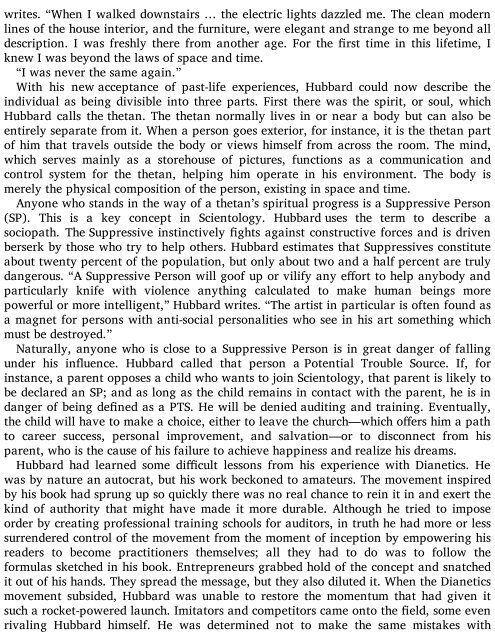going-clear-scientology-hollywood-and-the-prison-of-belief-by-lawrence-wright-2
going-clear-scientology-hollywood-and-the-prison-of-belief-by-lawrence-wright-2
going-clear-scientology-hollywood-and-the-prison-of-belief-by-lawrence-wright-2
Create successful ePaper yourself
Turn your PDF publications into a flip-book with our unique Google optimized e-Paper software.
writes. “When I walked downstairs … <strong>the</strong> electric lights dazzled me. The clean modern<br />
lines <strong>of</strong> <strong>the</strong> house interior, <strong>and</strong> <strong>the</strong> furniture, were elegant <strong>and</strong> strange to me beyond all<br />
description. I was freshly <strong>the</strong>re from ano<strong>the</strong>r age. For <strong>the</strong> rst time in this lifetime, I<br />
knew I was beyond <strong>the</strong> laws <strong>of</strong> space <strong>and</strong> time.<br />
“I was never <strong>the</strong> same again.”<br />
With his new acceptance <strong>of</strong> past-life experiences, Hubbard could now describe <strong>the</strong><br />
individual as being divisible into three parts. First <strong>the</strong>re was <strong>the</strong> spirit, or soul, which<br />
Hubbard calls <strong>the</strong> <strong>the</strong>tan. The <strong>the</strong>tan normally lives in or near a body but can also be<br />
entirely separate from it. When a person goes exterior, for instance, it is <strong>the</strong> <strong>the</strong>tan part<br />
<strong>of</strong> him that travels outside <strong>the</strong> body or views himself from across <strong>the</strong> room. The mind,<br />
which serves mainly as a storehouse <strong>of</strong> pictures, functions as a communication <strong>and</strong><br />
control system for <strong>the</strong> <strong>the</strong>tan, helping him operate in his environment. The body is<br />
merely <strong>the</strong> physical composition <strong>of</strong> <strong>the</strong> person, existing in space <strong>and</strong> time.<br />
Anyone who st<strong>and</strong>s in <strong>the</strong> way <strong>of</strong> a <strong>the</strong>tan’s spiritual progress is a Suppressive Person<br />
(SP). This is a key concept in Scientology. Hubbard uses <strong>the</strong> term to describe a<br />
sociopath. The Suppressive instinctively ghts against constructive forces <strong>and</strong> is driven<br />
berserk <strong>by</strong> those who try to help o<strong>the</strong>rs. Hubbard estimates that Suppressives constitute<br />
about twenty percent <strong>of</strong> <strong>the</strong> population, but only about two <strong>and</strong> a half percent are truly<br />
dangerous. “A Suppressive Person will go<strong>of</strong> up or vilify any eort to help anybody <strong>and</strong><br />
particularly knife with violence anything calculated to make human beings more<br />
powerful or more intelligent,” Hubbard writes. “The artist in particular is <strong>of</strong>ten found as<br />
a magnet for persons with anti-social personalities who see in his art something which<br />
must be destroyed.”<br />
Naturally, anyone who is close to a Suppressive Person is in great danger <strong>of</strong> falling<br />
under his inuence. Hubbard called that person a Potential Trouble Source. If, for<br />
instance, a parent opposes a child who wants to join Scientology, that parent is likely to<br />
be declared an SP; <strong>and</strong> as long as <strong>the</strong> child remains in contact with <strong>the</strong> parent, he is in<br />
danger <strong>of</strong> being dened as a PTS. He will be denied auditing <strong>and</strong> training. Eventually,<br />
<strong>the</strong> child will have to make a choice, ei<strong>the</strong>r to leave <strong>the</strong> church—which oers him a path<br />
to career success, personal improvement, <strong>and</strong> salvation—or to disconnect from his<br />
parent, who is <strong>the</strong> cause <strong>of</strong> his failure to achieve happiness <strong>and</strong> realize his dreams.<br />
Hubbard had learned some dicult lessons from his experience with Dianetics. He<br />
was <strong>by</strong> nature an autocrat, but his work beckoned to amateurs. The movement inspired<br />
<strong>by</strong> his book had sprung up so quickly <strong>the</strong>re was no real chance to rein it in <strong>and</strong> exert <strong>the</strong><br />
kind <strong>of</strong> authority that might have made it more durable. Although he tried to impose<br />
order <strong>by</strong> creating pr<strong>of</strong>essional training schools for auditors, in truth he had more or less<br />
surrendered control <strong>of</strong> <strong>the</strong> movement from <strong>the</strong> moment <strong>of</strong> inception <strong>by</strong> empowering his<br />
readers to become practitioners <strong>the</strong>mselves; all <strong>the</strong>y had to do was to follow <strong>the</strong><br />
formulas sketched in his book. Entrepreneurs grabbed hold <strong>of</strong> <strong>the</strong> concept <strong>and</strong> snatched<br />
it out <strong>of</strong> his h<strong>and</strong>s. They spread <strong>the</strong> message, but <strong>the</strong>y also diluted it. When <strong>the</strong> Dianetics<br />
movement subsided, Hubbard was unable to restore <strong>the</strong> momentum that had given it<br />
such a rocket-powered launch. Imitators <strong>and</strong> competitors came onto <strong>the</strong> eld, some even<br />
rivaling Hubbard himself. He was determined not to make <strong>the</strong> same mistakes with


